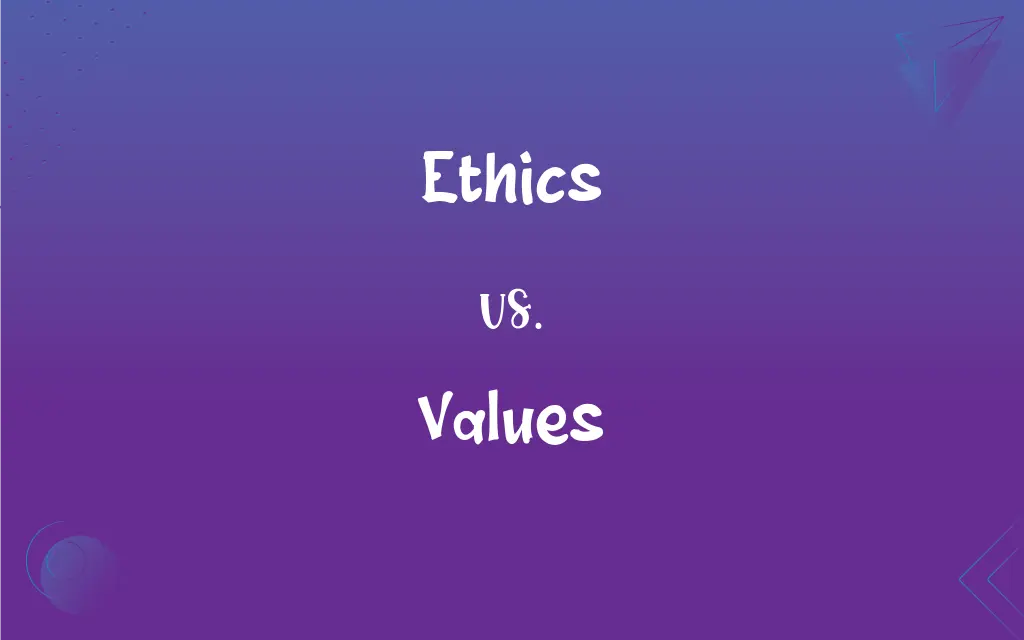Ethics vs. Values: What's the Difference?
Edited by Aimie Carlson || By Harlon Moss || Updated on October 14, 2023
Ethics refers to moral principles governing behavior, while values denote personal beliefs that influence actions.

Key Differences
Ethics generally delineates a set of moral principles that guide actions, especially in professional contexts. In contrast, values are deeply held beliefs that influence individuals' behavior and decision-making, often on a personal level.
Ethics, often encoded in professional guidelines or oaths, serve to establish a framework for morally correct actions within a certain context. On the other hand, values, while they inform ethical behavior, emanate from personal, cultural, or societal beliefs and affect all aspects of life.
Ethics usually involve a collective agreement on what is considered morally right or wrong in specific situations, providing a guideline for conduct. Values, however, might vary significantly among individuals, stemming from diverse personal, cultural, religious, and social influences.
In a corporate setting, ethics typically translate into a code of conduct that guides employees’ actions, ensuring they align with moral and legal standards. Values, while they might be reflected in a company’s culture, originate more organically and can be individual or shared within a community.
Understanding ethics often involves examining external, somewhat universal principles about what constitutes right conduct. Comprehending values may require internal exploration of what is deemed important or worthwhile on a personal or collective level.
ADVERTISEMENT
Comparison Chart
Acronym Meaning
Not applicable
Not applicable
Length
6 letters
6 letters
First Letter
E (Vowel)
V (Consonant)
Vowel Presence
Yes (E, I)
Yes (A, U, E)
Word Count
1 word
1 word
ADVERTISEMENT
Ethics and Values Definitions
Ethics
Ethics encompasses the moral principles governing behavior.
The doctor followed strict ethics to ensure patient confidentiality.
Values
Values can reflect priorities in one’s life or work.
Environmental values prompted him to choose a career in conservation.
Ethics
Ethics often implies adherence to established professional standards.
Her ethics prevented her from disclosing the confidential information.
Values
Values may derive from cultural, religious, or personal perspectives.
The community shared values that emphasized harmony and cooperation.
Ethics
Ethics can refer to a philosophical study of morality.
The philosopher specialized in ethics, exploring moral dilemmas and solutions.
Values
Values can influence ethical considerations and decisions.
Her values of honesty shaped her ethical approach to journalism.
Ethics
Ethics also implies accountability and transparency.
The company’s ethics were questionable, leading to public distrust.
Values
Values pertain to beliefs that dictate personal or societal behavior.
Her values were rooted in kindness and generosity toward others.
Ethics
Ethics involves differentiating between right and wrong.
His ethics were evident through his honest dealings in business.
Values
Values often guide choices and actions across various life aspects.
His values of diligence and integrity were evident in his work ethic.
Ethics
A set of principles of right conduct.
Values
An amount, as of goods, services, or money, considered to be a fair and suitable equivalent for something else; a fair price or return.
Ethics
A theory or a system of moral values
"An ethic of service is at war with a craving for gain" (Gregg Easterbrook).
Values
Monetary or material worth
The fluctuating value of gold and silver.
FAQs
Can values change over time?
Yes, values can evolve due to personal growth, experiences, or changes in beliefs and circumstances.
Do values always align with ethics?
Not necessarily; values are personal while ethics often involve adhering to a universal or collective moral code.
Is it possible to have ethics without values?
Ethics and values are interconnected; while they can be distinct, values often inform ethical considerations.
What is the origin of personal values?
Values originate from individual beliefs, cultural practices, social influences, or religious teachings.
Can societal values differ from individual values?
Yes, societal values reflect collective beliefs while individual values may vary based on personal beliefs and experiences.
Can ethical principles conflict with one another?
Yes, ethical principles can conflict, creating ethical dilemmas that require careful navigation and decision-making.
Can ethics be subjective?
While ethics aim to uphold universal moral principles, interpretations of ethical dilemmas can have a subjective element.
How do values influence relationships?
Values influence relationships by shaping interactions, understanding, and mutual respect among individuals.
How do ethics play a role in business?
Ethics in business guide decision-making processes, customer relations, and adherence to legal and moral obligations.
What forms the basis of ethics?
Ethics are based on moral principles and are often guided by social, professional, or legal norms.
Are ethics applicable in all areas of life?
While ethics, especially professional ethics, have specific applications, general ethical principles can apply broadly in life.
Are ethical considerations the same globally?
While some ethical principles are universal, specific ethical considerations can vary across different cultures and societies.
Can one’s values impact their ethical stance?
Absolutely, personal values can significantly influence an individual’s ethical considerations, decisions, and actions.
How does society enforce ethics?
Society enforces ethics through laws, professional guidelines, social norms, and sometimes, sanctions or penalties.
How are ethics taught or learned?
Ethics can be taught through education, mentoring, observing role models, and reflecting on moral dilemmas.
How can values be expressed?
Values are often expressed through actions, decisions, relationships, and various aspects of social and personal life.
Are values apparent in political beliefs?
Yes, values often shape political beliefs, influencing perspectives on governance, policy-making, and societal organization.
Can ethics vary between professions?
Yes, different professions have distinct ethics to address their specific practices and challenges.
Can values conflict with societal norms?
Yes, personal values can sometimes be at odds with prevailing societal norms or expectations.
How do values impact career choices?
Values can direct career choices by aligning professional paths with what is personally important or meaningful.
About Author
Written by
Harlon MossHarlon is a seasoned quality moderator and accomplished content writer for Difference Wiki. An alumnus of the prestigious University of California, he earned his degree in Computer Science. Leveraging his academic background, Harlon brings a meticulous and informed perspective to his work, ensuring content accuracy and excellence.
Edited by
Aimie CarlsonAimie Carlson, holding a master's degree in English literature, is a fervent English language enthusiast. She lends her writing talents to Difference Wiki, a prominent website that specializes in comparisons, offering readers insightful analyses that both captivate and inform.































































